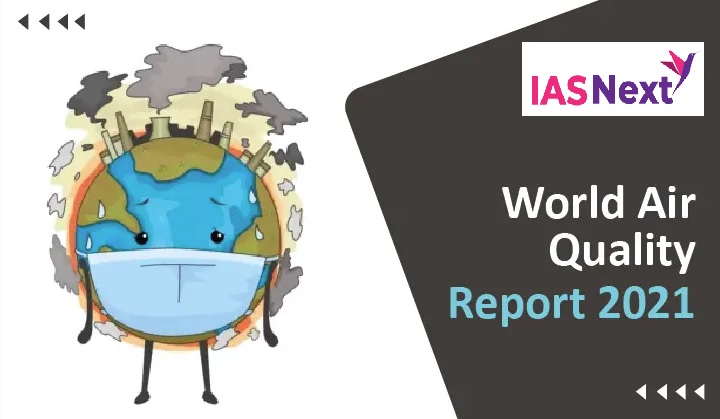CURRENT AFFAIRS
Get the most updated and recent current affair content on Padhaikaro.com
World Air Quality Report 2021
- IAS NEXT, Lucknow
- 26, Mar 2022

The 2021 World Air Quality Report was released, the report presented an overview of the state of global air quality in 2021.
- Released by IQAir, a Swiss group that measures air quality levels based on the concentration of Particulate Matter (PM) 2.5.
Key findings:
- Bangladesh was the most polluted country in the world in 2021. Bangladesh recorded an average PM2.5 level of 76.9 micrograms per cubic metre in 2021 against the World Health Organisation (WHO) recommended maximum permissible level of 5 micrograms per cubic metre.
- Earlier, in 2018, 2019 and 2020 also Bangladesh was found to be the most polluted country in the world.
- The data reveals that not a single country in the world managed to meet the WHO’s air quality standard in 2021.
- All over the world, 93 cities reported PM 2.5 levels at 10 times the recommended level.
- Among the cities, Dhaka was the second most polluted city in the world with a PM 2.5 level of 78.1 just below New Delhi which had a PM 2.5 level of 85.1 in 2021.
Performance of India:
- New Delhi continues to be the world’s most polluted capital city for the fourth consecutive year.
- As per the report, in 2021, India was home to 11 of the 15 most polluted cities in Central and also in South Asia.
- 35 Indian cities have been listed by the index under the worst air quality tag for 2021.
- Bhiwadi, Rajasthan topped this list and was followed Ghaziabad, Uttar Pradesh.
Concerns associated with air pollution:
- Air pollution is now considered to be the world’s largest environmental health threat, accounting for seven million deaths around the world every year.
- Air pollution causes and aggravates many diseases, ranging from asthma to cancer, lung illnesses and heart disease.
- The estimated daily economic cost of air pollution has been figured at $8 billion (USD), or 3 to 4 per cent of the gross world product.
What can governments do?
- Decrease air pollution emissions.
- Pass legislation to incentivize the use of clean air vehicles for personal and industrial use.
- Invest in renewable energy sources.
- Provide financial incentives, such as trade-in programs, to limit the use of internal combustion engines.
- Provide subsidies to encourage the use of battery and human-powered transportation methods.
- Expand public transportation and power with clean and renewable energy sources.